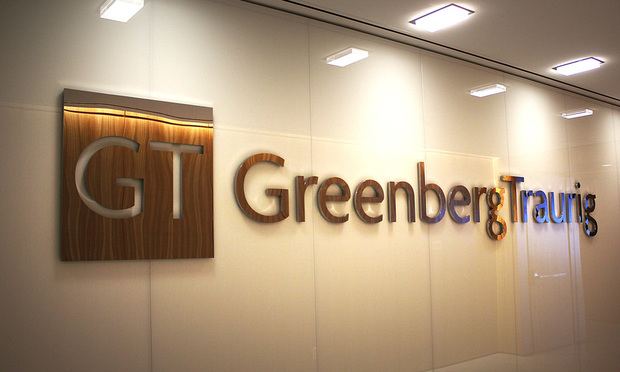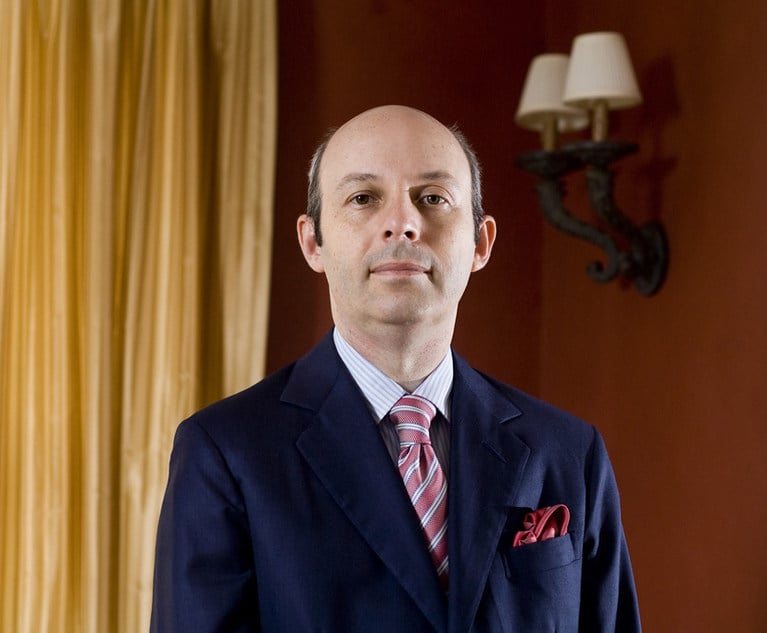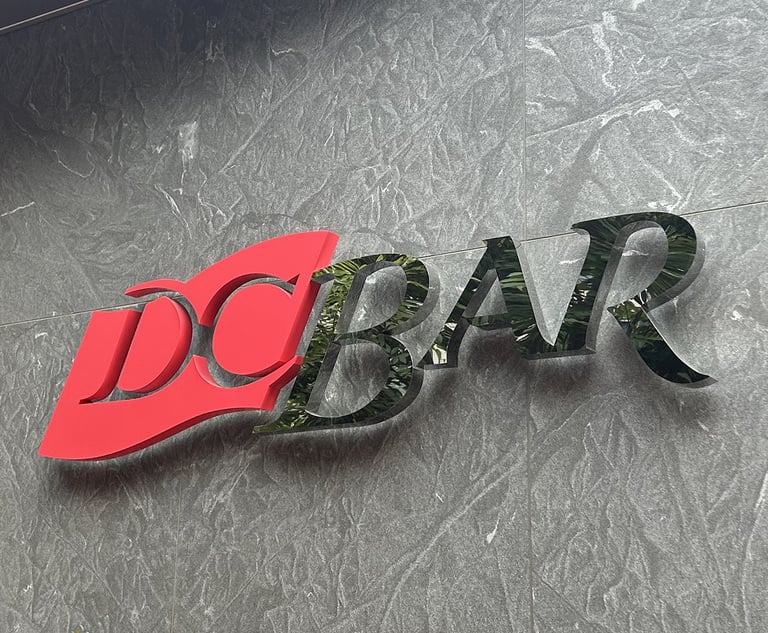Greenberg Traurig Wins $2M Fee Award in Suit Against US Government
A federal claims court judge on Tuesday ordered the government to pay $2 million in legal fees to Greenberg Traurig for its work representing a Florida real estate developer that prevailed in a long-running case over the denial of a permit to fill in wetlands.
November 15, 2017 at 02:20 PM
5 minute read
 Greenberg Traurig's Miami office. Credit: J. Albert Diaz / ALM
Greenberg Traurig's Miami office. Credit: J. Albert Diaz / ALM
A federal claims court judge on Tuesday ordered the government to pay $2 million in legal fees to Greenberg Traurig for its work representing a Florida real estate developer that prevailed in a long-running case over the denial of a permit to fill in wetlands.
After two rounds through U.S. Court of Federal Claims, each followed by an appeal to the U.S. Court of Appeals for the Federal Circuit, the company, Lost Tree Village Corp., prevailed in its challenge when the U.S. Supreme Court declined in June to hear the case.
The U.S. Department of Justice had asked the high court to review a 2015 decision that said the U.S. government's denial of the fill permit amounted to an uncompensated “taking” of Lost Tree's property.
Charles Lettow, a judge on the U.S. Court of Federal Claims, ordered the government to pay $4.2 million in damages, plus $3.5 million in interest. Lost Tree Village Corp.'s lawyers at Greenberg Traurig, led by Washington partner Jerry Stouck, had argued the government owed more.
Stouck this summer went to the Federal Claims court seeking about $2 million in attorney fees from the government, along with $100,000 in other fees and expenses incurred by Lost Tree.
Stouck, chairman of the firm's regulatory and administrative law practice, identified Lost Tree's legal fees in remarkable detail, noting a period in which he and two other principal timekeepers at Greenberg Traurig had given discounts of between 5 and 15 percent of the standard hourly rates. Stouck identified his standard billing rate, for 2017, at $810 an hour.
Greenberg Traurig's court filings reveal standard billing rates for Stouck and other Greenberg lawyers from 2007 to now.
For the first appeal to the Federal Circuit, Stouck said, the firm and Lost Tree agreed on a fixed fee of $67,00, plus expenses, with an additional $300,000 payable only if Greenberg Traurig prevailed. (It did so.)
The $300,000 success fee, under the terms of the agreement, would be “recoverable from the government as part of the reasonable attorneys' fees due to Lost Tree.” Stouck told the court that Lost Tree “has achieved complete success.” He added: “Perhaps more importantly, while this case was hard-fought and long-fought, Lost Tree has prevailed completely on what both parties and the court recognized from the outset was the principle issue to be decided—the 'relevant parcel' issue.”
The Justice Department, arguing that Greenberg Traurig's billing “reflects excessive rates for attorney and paralegal work,” said Lost Tree should be awarded at most $1,078,121 in fees. In a court filing, the Justice Department said Greenberg Traurig billed for “work done on matters unrelated to this case and irrelevant to the merits, work where the hours devoted to tasks were far beyond reasonable or duplicated by multiple attorneys, and work where very senior personnel were performing tasks typically done by more-junior personnel.”
From the government's filing: “Most egregiously, plaintiff seeks reimbursement for a $300,000 bonus not-yet paid that is not based on work done for the case, but instead because they were victorious on appeal. The United States has not waived its sovereign immunity to reimburse 'success fees' sought in addition to fees for the hours actually devoted to work on the case.”
The Justice Department declined to comment Wednesday on the fee award. Stouck said he was surprised not by the judge's ruling on legal fees but by the tenacity with which the government challenged his request.
“I was actually surprised that the government had disputed our fees so aggressively because, as you can see from the opinion, my client has paid all of the fees,” Stouck said. “And I think that is a very substantial proof of the reasonableness of it.”
In a court filing, Stouck defended the $300,000 success fee as not just reasonable but a “greatly reduced” fee for the appeal. “This is not a situation where Greenberg is seeking an 'enhancement' to its hourly rates,” he wrote in a court filing. “Lost Tree and Greenberg are simply asking the court to enforce their reasonable, arm's length agreement. In the context of this case, the alternative fee arrangement represents Greenberg's commercially-available rate.”
The judge did not award the success fee but did award $91,000 in fees that were incurred beyond the fixed expense of $67,500.
Greenberg Traurig's fee request is posted below:
The judge's ruling on fees is posted below:
This content has been archived. It is available through our partners, LexisNexis® and Bloomberg Law.
To view this content, please continue to their sites.
Not a Lexis Subscriber?
Subscribe Now
Not a Bloomberg Law Subscriber?
Subscribe Now
NOT FOR REPRINT
© 2025 ALM Global, LLC, All Rights Reserved. Request academic re-use from www.copyright.com. All other uses, submit a request to [email protected]. For more information visit Asset & Logo Licensing.
You Might Like
View All
SCOTUSblog Co-Founder Tom Goldstein Misused Law Firm Funds, According to Federal Indictment
2 minute read
'Lack of Independence' or 'Tethered to the Law'? Witnesses Speak on Bondi
4 minute read
DC Bar’s Proposed Anti-Discrimination, Harassment Conduct Rule Sees More Pushback

Full 8th Circuit Hears First Amendment Challenge to School District’s ‘Equity Training’
Trending Stories
- 1Wells Fargo and Bank of America Agree to Pay Combined $60 Million to Settle SEC Probe
- 2Legaltech Rundown: Robin AI Releases In-house Tool, Epona Merges With JustiSolutions, and More
- 3As Lawmakers Eye Need for NY Supreme Court Posts, Could a Ballot Question Remove the Constitutional Limit?
- 4State Appellate Court Rejects Reasoning for Attorney's Removal From Conservatorship
- 5How Cohen Seglias Started With a Construction Practice and Turned It Into a Full-Service Law Firm
Who Got The Work
J. Brugh Lower of Gibbons has entered an appearance for industrial equipment supplier Devco Corporation in a pending trademark infringement lawsuit. The suit, accusing the defendant of selling knock-off Graco products, was filed Dec. 18 in New Jersey District Court by Rivkin Radler on behalf of Graco Inc. and Graco Minnesota. The case, assigned to U.S. District Judge Zahid N. Quraishi, is 3:24-cv-11294, Graco Inc. et al v. Devco Corporation.
Who Got The Work
Rebecca Maller-Stein and Kent A. Yalowitz of Arnold & Porter Kaye Scholer have entered their appearances for Hanaco Venture Capital and its executives, Lior Prosor and David Frankel, in a pending securities lawsuit. The action, filed on Dec. 24 in New York Southern District Court by Zell, Aron & Co. on behalf of Goldeneye Advisors, accuses the defendants of negligently and fraudulently managing the plaintiff's $1 million investment. The case, assigned to U.S. District Judge Vernon S. Broderick, is 1:24-cv-09918, Goldeneye Advisors, LLC v. Hanaco Venture Capital, Ltd. et al.
Who Got The Work
Attorneys from A&O Shearman has stepped in as defense counsel for Toronto-Dominion Bank and other defendants in a pending securities class action. The suit, filed Dec. 11 in New York Southern District Court by Bleichmar Fonti & Auld, accuses the defendants of concealing the bank's 'pervasive' deficiencies in regards to its compliance with the Bank Secrecy Act and the quality of its anti-money laundering controls. The case, assigned to U.S. District Judge Arun Subramanian, is 1:24-cv-09445, Gonzalez v. The Toronto-Dominion Bank et al.
Who Got The Work
Crown Castle International, a Pennsylvania company providing shared communications infrastructure, has turned to Luke D. Wolf of Gordon Rees Scully Mansukhani to fend off a pending breach-of-contract lawsuit. The court action, filed Nov. 25 in Michigan Eastern District Court by Hooper Hathaway PC on behalf of The Town Residences LLC, accuses Crown Castle of failing to transfer approximately $30,000 in utility payments from T-Mobile in breach of a roof-top lease and assignment agreement. The case, assigned to U.S. District Judge Susan K. Declercq, is 2:24-cv-13131, The Town Residences LLC v. T-Mobile US, Inc. et al.
Who Got The Work
Wilfred P. Coronato and Daniel M. Schwartz of McCarter & English have stepped in as defense counsel to Electrolux Home Products Inc. in a pending product liability lawsuit. The court action, filed Nov. 26 in New York Eastern District Court by Poulos Lopiccolo PC and Nagel Rice LLP on behalf of David Stern, alleges that the defendant's refrigerators’ drawers and shelving repeatedly break and fall apart within months after purchase. The case, assigned to U.S. District Judge Joan M. Azrack, is 2:24-cv-08204, Stern v. Electrolux Home Products, Inc.
Featured Firms
Law Offices of Gary Martin Hays & Associates, P.C.
(470) 294-1674
Law Offices of Mark E. Salomone
(857) 444-6468
Smith & Hassler
(713) 739-1250










